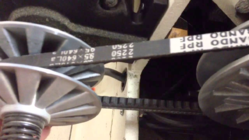Hi,
For a couple weeks I noticed that my when my lathe was set to a lower rpm that it was much harder to turn the handwheel than in the past. At fast speeds I wouldn't notice it at all (once I had obviously turned the machine back off again).
Then a week ago I noticed that there's somewhat of a high pitched sound that goes in and out. Is this related? Are they two separate problems I need to deal with? Any idea how to fix either? Has the pulley gone bad?
There is a link to a sound file that I recorded of the noise.
Audio Link to Noise
View: https://soundcloud.com/dan-w-4/new-recording-81?si=803911cc750440af948ea0c73a694672&utm_source=clipboard&utm_medium=text&utm_campaign=social_sharing
I use a Jet 14"x42" JWL-1442VS.
I guess I just never remembered it being difficult to turn the handwheel before. Does something need oil or something? Or you think I just never realized beforehand that I was on a lower RPM.
Any suggestions would be wonderful.
thanks!
- dan
For a couple weeks I noticed that my when my lathe was set to a lower rpm that it was much harder to turn the handwheel than in the past. At fast speeds I wouldn't notice it at all (once I had obviously turned the machine back off again).
Then a week ago I noticed that there's somewhat of a high pitched sound that goes in and out. Is this related? Are they two separate problems I need to deal with? Any idea how to fix either? Has the pulley gone bad?
There is a link to a sound file that I recorded of the noise.
Audio Link to Noise
View: https://soundcloud.com/dan-w-4/new-recording-81?si=803911cc750440af948ea0c73a694672&utm_source=clipboard&utm_medium=text&utm_campaign=social_sharing
I use a Jet 14"x42" JWL-1442VS.
I guess I just never remembered it being difficult to turn the handwheel before. Does something need oil or something? Or you think I just never realized beforehand that I was on a lower RPM.
Any suggestions would be wonderful.
thanks!
- dan

